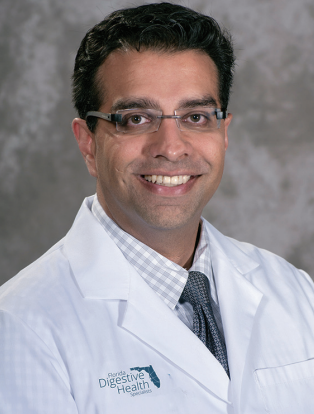- April 25, 2024
-
-
Loading

Loading

March is Colorectal Cancer awareness month. Do you know the importance of prevention and early detection?
Gastroenterologist Arun Khazanchi, MD, of Florida Digestive Health Specialists, answers some of the most common questions about colon cancer and screening.

Q: What is colorectal cancer?
A: Colorectal cancer is a type of cancer that begins in the large intestine (colon) or rectum, which is near the end of the digestive tract. It usually begins as small polyps, or noncancerous clumps of cells that form inside the colon. Over time, some of these polyps can become cancerous.
Q: Who is at risk for this type of cancer?
A: If you have a history of polyps, cancer, inflammatory bowel disease or a family history of colon/rectal cancer, you may be at increased risk. Diets high in red meat or processed meats, low-fiber diets, lack of exercise, obesity, smoking and heavy alcohol use can also contribute to the chance of developing colon cancer. A healthy lifestyle combined with routine colorectal screenings can help prevent colorectal cancer.
Q: What are some of the signs and symptoms of colon cancer?
A: Early colon cancer usually presents without any symptoms at all, which is why screening is very important. However, as the tumor grows, symptoms can arise, such as abdominal pain, which can vary in location and intensity, or a change in bowel habits, such as frequency and consistency of stool. When the disease is in an advanced stage, some people can experience unexpected weight loss, abdominal distention, anemia, jaundice, passage of bloody stools, nausea and vomiting. If you are experiencing any of these symptoms, please consult with your doctor.
Q: How prevalent is this type of cancer?
A: Colorectal cancer is the third-leading cause of cancerrelated deaths in the United States.* Early detection is key to successful treatment and outcomes from this type of cancer.
Q: When should I get my colonoscopy?
A: The American College of Gastroenterology (ACG) recommended that all average risk individuals begin screening at age 45.
Q: What exactly is a colonoscopy?
A: A colonoscopy is an exam used to detect changes or abnormalities in the large intestine (colon) and rectum. During a colonoscopy, a long, flexible tube (colonoscope) is inserted into the rectum. A video camera at the tip of the tube allows the doctor to view the inside of the entire colon. If necessary, polyps or other types of abnormal tissue can be removed during a colonoscopy. Tissue samples (biopsies) can be taken during a colonoscopy as well. There is no pain involved in the procedure, which usually takes 15-20 minutes.
If you need a doctor, call our free physician referral service at 800-454-8215 or visit lwrmc.com.